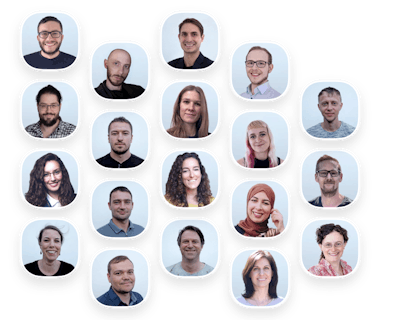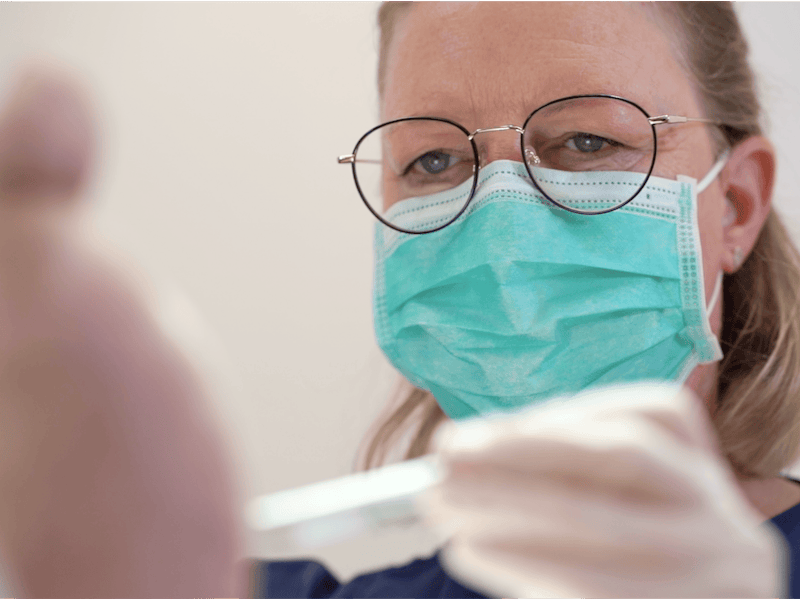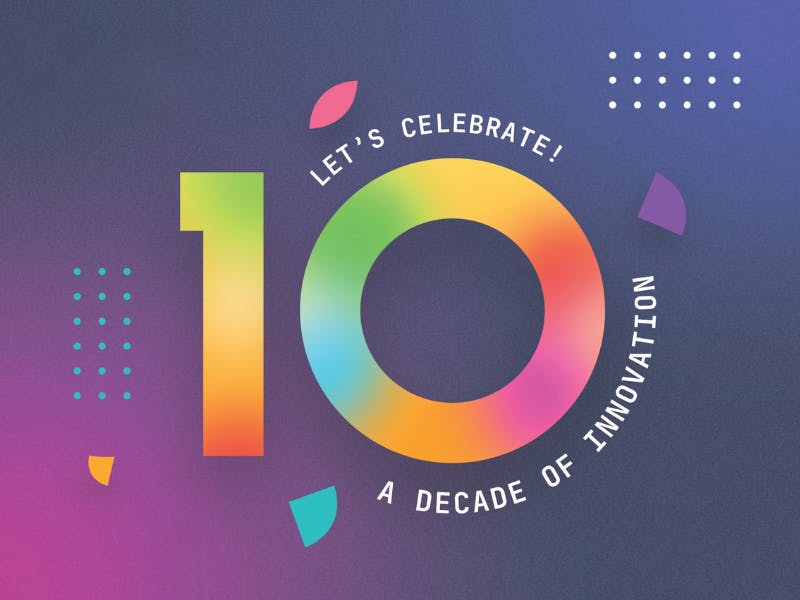For the past three years, Anastasiya has been our Product Owner at imito. In this interview, she shares what motivated her to also become a paramedic, how dancing led her to learn German, and whom she admires.
Anastasiya, how did you end up in the medical field?
Already at university during my master’s studies, I took a few courses about the usability of software in hospitals. Then I found a student job at the Charité hospital in Berlin, where I also wrote my master’s thesis about an app for teenagers with sickle cell disease - that was very interesting.
 © Canva / sciencephotolibrary
© Canva / sciencephotolibrary
After graduation, I worked for a company that created practice management software, as well as for a firm that helped health insurers with data processing. Now, I love keeping the imito development team together as a Product Owner to create useful medical tools. For me, it’s important that my work has meaning and does good in the world.
 © imito AG / Chrysanth Sulzberger
© imito AG / Chrysanth Sulzberger
You recently became a paramedic on the side - what motivated you?
Yes, through the training, I wanted to see real clinical life on the other side of the documentation devices we create software for at imito. Besides, my sister has been a nurse for 20 years and has always shared really fascinating stories about her work.
 © Canva / gettysignature
© Canva / gettysignature
During my internships at the hospital and emergency service, I really enjoyed learning from experienced people how to quickly assess critical situations while staying calm. These were two intense weeks in the hospital and 14 intense twelve-hour shifts with the emergency services.
But you were also a journalist at one point, right?
Yes, in 2006 at the Moscow Times. At the time, it was the largest expat newspaper in Russia, with around 30,000 copies printed daily. I enjoyed working in the news department because I got to travel to various events and press conferences and write about them.
 © Canva / gettyimagespro
© Canva / gettyimagespro
Now you “only” write Jira tickets (IT tasks)?
Yes, but I’ve always enjoyed analytical writing rather than creative writing. Analysing information, compiling it, and presenting it in a way that’s easy to understand is something I really love - and no AI can take that away from me.
I also have to say that journalism and IT software development have similarities. As an adrenaline junkie, they both provide me with pressing deadlines and exciting situations where important decisions have to be made.
 © Canva / yevhen-cherkasov
© Canva / yevhen-cherkasov
The love of analysis - you once conducted a usability test at imito to study user behaviour?
Yes, I ran a usability test for our automatic wound-edge detection. In addition to the experts at our customers’ sites, my nurse sister also participated. It was really interesting to see how people interact with the feature and what they expect. Now the feature is live!
 © imito AG / Chrysanth Sulzberger
© imito AG / Chrysanth Sulzberger
Besides the automatic wound-edge detection, was there a software update you’re particularly proud of?
I mean, every release is exciting, but what I really liked was our body map update in 2024. A customer approached us and stressed that they really needed this update. Now, it’s not only possible to select multiple body parts, but the new body map allows a much more detailed selection - for example, a single toenail. The app then translates the visual selection into the correct medical terms for documentation.
 © imito AG / Laura Döring
© imito AG / Laura Döring
Who do you now work with the most in the imito team, and what do you appreciate about them?
With the developers, Stanislav, our UX designer, Donika, our QA engineer, and Michaela, our release manager. But probably the person I talk to most is our CTO, Manuel. I appreciate working with him because I really think he has common sense - in how he assesses problems and approaches solutions. He lets me know what he needs and then gives me the freedom to get the work done in my own style.
 © imito AG / Chrysanth Sulzberger
© imito AG / Chrysanth Sulzberger
But I also want to mention that Michaela, our release manager, has made my work much easier over the past few months. She herself trained as a nurse and also worked in hospital IT for a long time.
She communicates to our users what we’ve improved, and her perspective in doing the final testing of our software is invaluable. This way, we adapt the apps from medical professionals for medical professionals, and she’ll also sometimes say, “No, that would really annoy me in my work. This definitely needs to be fixed.”
 © imito AG / Michaela Keller
© imito AG / Michaela Keller
You work fluently in English and German at imito - where did you learn the languages?
That’s actually a funny story. I was born in Russia, but as a child, my family moved to the West Coast of the USA. During school, I loved that you could take dance classes instead of regular PE.
I especially enjoyed it because of my funny and energetic dance teacher at the time. At some point, she said, “Next year I’ll be teaching English.” Because my friends and I liked her so much, we signed up for English - and sure enough, English classes with her were just as exciting.
 © Canva / pexels
© Canva / pexels
Then at some point she said, “Next year I’ll be teaching German. Because anyone who wants to succeed in life should learn German. German is the language of money.” So several of my friends and I chose German just because of her, not French or Spanish. At university, I continued learning German, for example German children’s rhymes: “Auf der Mauer, auf der Lauer sitzt eine fette Wanze” - I learned that back in New York. Now, I’ve been living in Berlin for almost 19 years.
You once lived the New York City life?
Yes, when I moved out from my parents’ place, I went straight to New York City to do my Bachelor in Computer Science. I enjoyed going to concerts and clubs while I was there, walked a lot around Manhattan, but also really appreciated Central Park.
 © Canva / gettyimagespro
© Canva / gettyimagespro
Living in New York was my childhood dream. Back then, there were these chewing gums with little pictures inside. One time there was a picture of New York - and wow - it sparked in me the desire to live there someday. And then I made it happen.
After university, at 22, I actually wanted to go to Germany right away, but that didn’t work out at first. Then I worked as a translator and journalist in Russia for five years, until I finally made it to Germany. Now in Berlin, I appreciate the relaxed atmosphere. By the end of my four years in New York, the pace of the city no longer felt right.
What do you do now in Berlin to relax?
Sports. Yes, doing sports is a must. Four to five times a week - something that leaves me completely sweaty by the time I get home. Three times a week interval training and twice Pilates. Swimming when I can’t do the other workouts. My doctor recently said, “You’re quite flexible.” Yes, of course I’m flexible, and I’m really happy about that.
Besides that, I like reading. I am part of a literature course with a wonderful teacher. We meet, she tells me about a book, the author, and the historical context of that time. Then we think about which other books or authors we could compare it to and what we can learn from it.
 © Canva / pexels
© Canva / pexels
But then there’s also volunteer work in your life, right?
Yes, exactly. In our project, we send all sorts of things to Ukraine. Many medical items - hospital beds are highly appreciated, bandages, wheelchairs, walking sticks, hygiene products - but also laptops, smartphones, bicycles, and other things. At Christmas, we send gifts to bring people a little joy. We receive these items from various donation events and partners, then sort, pack, and send them on.
Finally - whom do you admire?
I would say: people who have passion. In the volunteer project, there’s a woman who herself is a Ukrainian war refugee. She’s 57 - but so full of life. She’s always on the move, doing things, always in a great mood. Somehow, she inspires everyone.
Recently she said, “Yes, I mean, after walking about 15 kilometres, my hip hurts a little, but otherwise everything’s fine.” I think I want to be like her at any age. Just full of energy and joy for life, not stuck in a rigid mindset - but open and physically active.
Anastasiya, we admire you for your ability to stay calm during emergencies and then to orchestrate, step by step, who should do what next.





